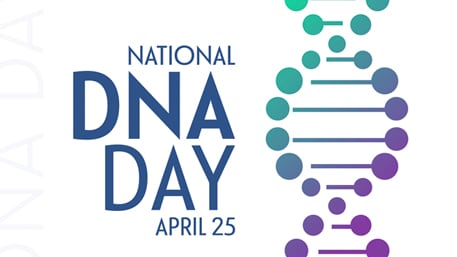Celebrate National DNA Day on April 25th!

What to know
This National DNA Day, CDC is sharing resources to help people learn more about how their DNA can affect their health. Activities and resources include lesson plans and other helpful tools for teachers, an essay contest for high school students, a toolkit for scientists planning to present at schools, registration information for this year’s National DNA Day lecture, and a starter kit for planning your own National DNA Day event.
Overview
CDC’s experts help protect lives and livelihoods, prevent disease, and reduce health inequities for people with genetic conditions of all ages, so they can have the opportunity to be as healthy as possible. This National DNA Day, CDC is sharing resources to help people learn more about how their DNA can affect their health. Healthcare providers, scientists, and educators can also use these resources to share their expertise with their communities.
National DNA Day is the perfect time to share what you know about DNA and to learn more. Visit the National DNA Day website to find resources for teachers, students, and anyone else who wants to improve their understanding of DNA, genetics, and genomics. Read more about how you can participate in National DNA Day.
National DNA Day activities and resources include
- DNA Day Activity Ideas. Whether you are a teacher who wants to help your students learn more about DNA or a scientist who needs ideas for how to talk to students in your community about genetics, visit the National DNA Day website for helpful resources. Modules for classroom outreach, lesson plans, and educational videos on scientific topics and experiments are among the many resources listed. Teachers and parents: There are even contests where your students can show off what they’ve learned.
- American Society of Human Genetics’ DNA Day Essay Contest for High School Students. Winning essays will be posted on April 25. Read students’ examples of how the interplay of genetics and environment can shape human health.
- Genome: Unlocking Life’s Code’s Ten Helpful Tools for Teaching DNA. Explore different resources to increase your understanding of DNA and find ideas for the classroom.
- Genetics Engagement & Education Network. Search this American Society of Human Genetics network to find genetics experts near you who can answer your genetics-related questions. The Genetics Engagement & Education Network Toolkit is geared toward scientists planning to present at schools, but teachers and parents might also find it helpful. The toolkit includes lessons, games, case studies, direct-to-consumer kit information, and helpful tips on presenting at schools.
- National Human Genome Research Institute Annual Louise M. Slaughter National DNA Day Lecture. The National Human Genome Research Institute (NHGRI) at the National Institutes of Health will host a lecture by former National Public Radio science correspondent Joe Palca titled “Do People Really Know What DNA Is?” on April 26, 2024, 3–4 p.m. ET. The lecture will explore questions such as, “What does DNA mean to someone who is not a biologist?” and “How much does someone need to know about DNA to make informed decisions about genetic engineering, genetic privacy, or when life begins?” Register beforehand to attend in person or virtually. Follow #NHGRIevents and #DNADay24 on social media for more information.
- Use the DNA Day Starter Kit if you’d like to plan an event yourself, and register your event so it can be listed on the National DNA Day Network Map.
Congress approved the first National DNA Day in April 2003 to celebrate both the completion of the Human Genome Project and the 50th anniversary of the discovery of the double helix structure of DNA.